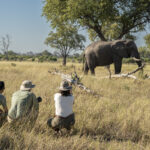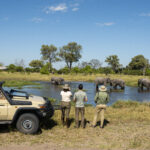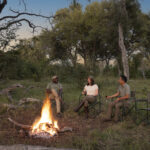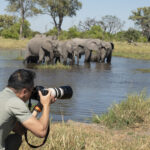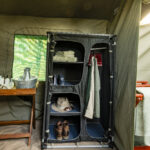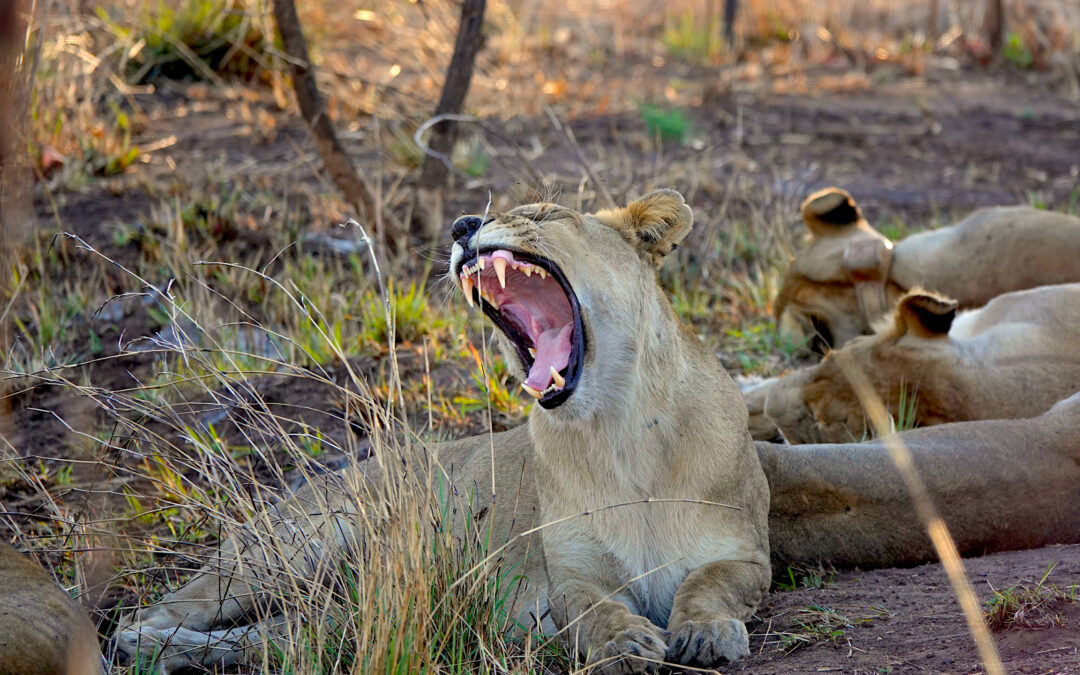
Apr 2, 2020 | Animals of Botswana, Conservation
Seeing big cats on safari is the dream! After all, who wouldn’t want to sit beside a lion, watch a leopard hunt, or stand in awe of a cheetah’s run? But did you know that there are more cats in Botswana than you might think?
As the next submission in our Brave Africa blog series Animals of Botswana, we’re tackling all of Botswana’s cats—big and small. Get to know all the different types of cats you could enjoy and why we love them. You could see many of these on your next game drive with us!
Lion
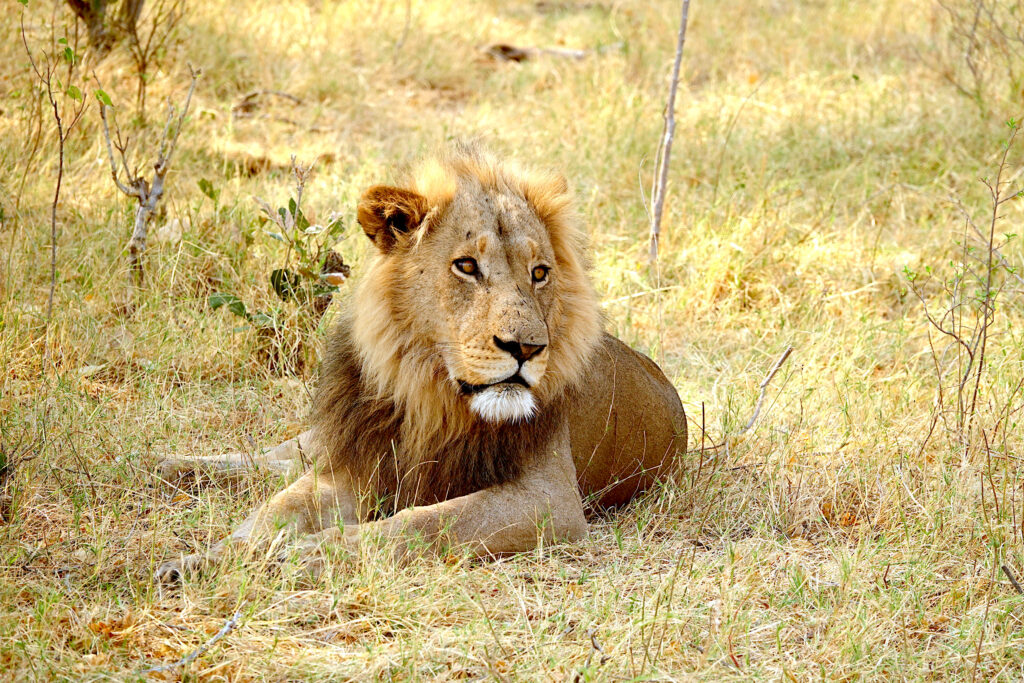
The largest lion on record weighed 375 kg (826 lbs).
Lions are the kings of the African bush. As an apex predator, they roam the open savannahs and grasslands of Botswana, looking for prey. They are the second-largest cat in the world, known for their strength, ferocity, and laziness. J Unfortunately, they are also becoming rarer and rarer in the wild. There are only about 20,000 African lions left, and they are listed as “Vulnerable” on the endangered species list. In Botswana, these cats are fairly prevalent with the second-largest population in all of Africa.
How to recognize lions:
Lions are easy to identify because they are massive, weighing up to 180kg (400 lbs)! Here are a few more characteristics:
- Lions have yellow-gold fur that’s generally short. Adult males typically boast a mane of long, brownish hair encircling their heads.
- Lions roar to declare territory, ward of rivals, call for backup, and communicate with their pride. Their roar can be heard up to 8km away.
- Lions are well-muscled cats with long bodies, large heads, and short legs.
Where can you find lions?
Lions can be found all across Botswana’s wilderness from the arid desert of the Kalahari to the swamplands of Moremi and the grasslands of Savuti. You’ll find lions both as solitary individuals as well as in prides of up to 40 lions. While lions can live and hunt in almost any habitat, they prefer grasslands, shrubs, and open woodlands.
Leopard
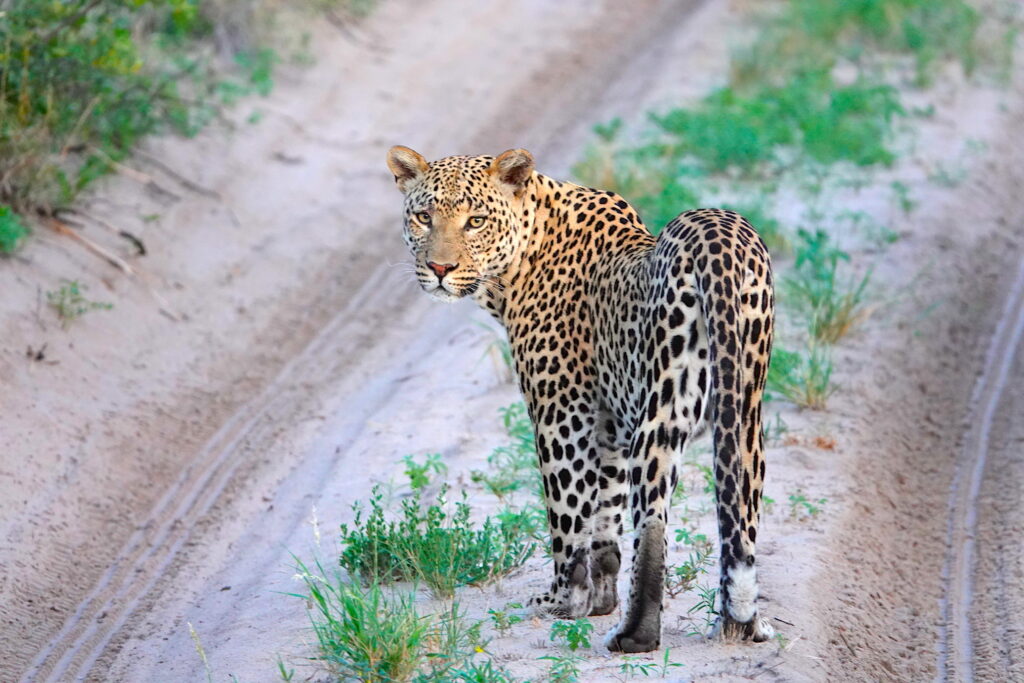
Leopards are highly skilled climbers that use trees to keep prey from scavengers.
Leopards are some of the most elusive cats in all of Africa. They are nocturnal predators known for their exceptional night vision and climbing abilities. They are graceful hunters that are also incredibly adaptable. They aren’t just found in Africa. You can find leopards all over the world in a diverse array of climates, from jungles to forests and deserts across India, China, Central Asia, and Africa.
How to recognize leopards:
Arguably, leopards are one of the most beautiful cats in Botswana and all of Africa, but they are very secretive. That’s why it’s essential to know how to recognize them.
- Leopards are known for their light yellow fur covered in distinctive spots known as rosettes. These irregular dark spots are circular or square in shape and sort of look like roses.
- Leopards are medium-sized cats weighing between 24 to 53 kg (53 – 115 lbs) and are extremely muscular.
- Leopards make a very distinctive hoarse, raspy cough sound to communicate with their young and mark their territory. They can also hiss when threatened.
Bonus: Some leopards can be completely black, although this is a rare coat color that’s the opposite of albinism.
Where can you find leopards?
Botswana leopards enjoy a wide range of habitats from dense bush to forests. They enjoy both hot and cold climates, including semi-desert regions. You can find leopards on the ground as often as they are in the trees, although if they’ve made a recent kill, their dinner will almost always be in a tree to keep it out of reach of scavengers.
The most common of Botswana’s cats, leopards can be found all over, but your best chances are in the Moremi Game Reserve. However, it’s important to note that a high concentration of lion means it is less likely you’ll see a leopard, as it is too dangerous for them to hunt.
Cheetah
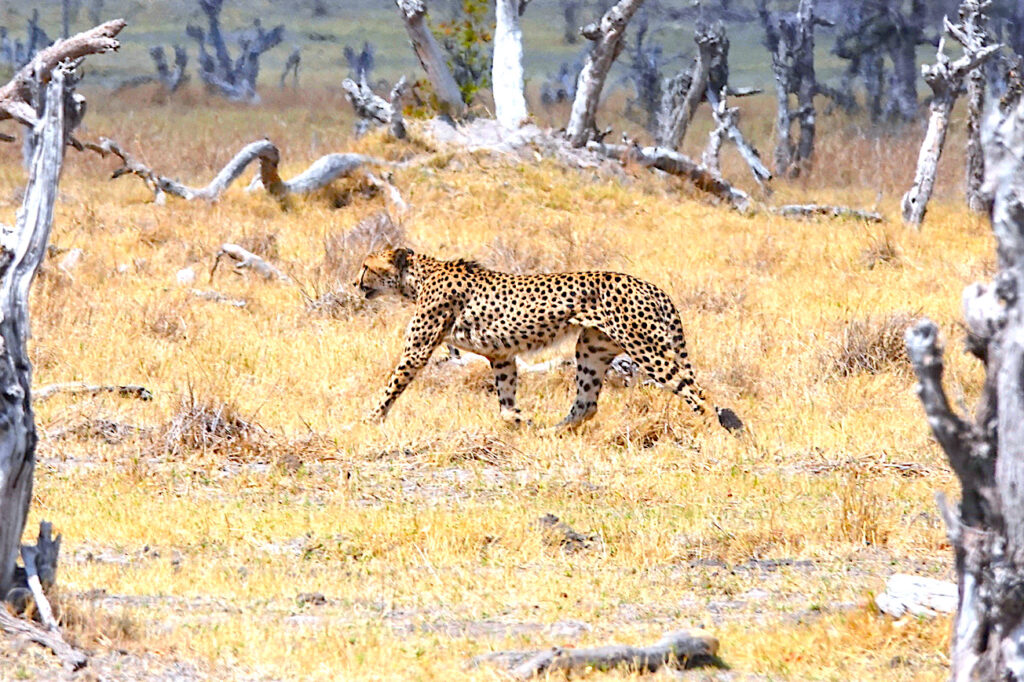
Cheetahs can accelerate faster than a sports car, reaching up to 112 km/hr in three seconds.
Cheetahs are some of the smallest of the big cats in Botswana, but they are also the fastest. They can go from 0 to 96 kilometers an hour (60 mph) in just three seconds. Even at these high speeds, cheetahs are very agile and can make sudden turns to catch their prey. They have exceptionally keen eyesight, which makes them one of the few big cats that prefer to hunt in the daylight.
How to recognize cheetahs:
As the fastest land mammal, cheetahs can be hard to come by. They are solitary by nature and highly timid, which means you have to be very lucky to see one.
- Cheetahs are smaller cats weighing between 34 and 57 kg (75 – 125 lbs). They have a thin frame, a narrow waist, and a deep chest, giving them the appearance of a long, very slender body.
- Golden in color, cheetahs have solid black spots and very distinctive black facial strips running from their eyes, which almost look like tears.
- Cheetahs are very vocal. They purr when content, and growl, hiss, spit, moan, and yowl in danger, annoyance, or to threaten other predators. One of their most distinctive sounds is the chirp, which they use when excited. It can be heard up to 2km away.
Where can you find cheetahs?
Cheetahs are nomads by nature, which means they never stay in one place for long and can cover vast distances in search of prey. They can most often be found in wide-open grasslands where it’s easier to run after prey as needed. However, because it takes a large amount of energy to catch and kill their prey, they prefer to hang out in the shade to preserve what energy they can.
Botswana is home to 25% of the world’s remaining cheetah population and is the ONLY country where the population remains stable. They can be found throughout the Okavango Delta in any area where there are open plains. Savuti typically offers your best chance.
Serval
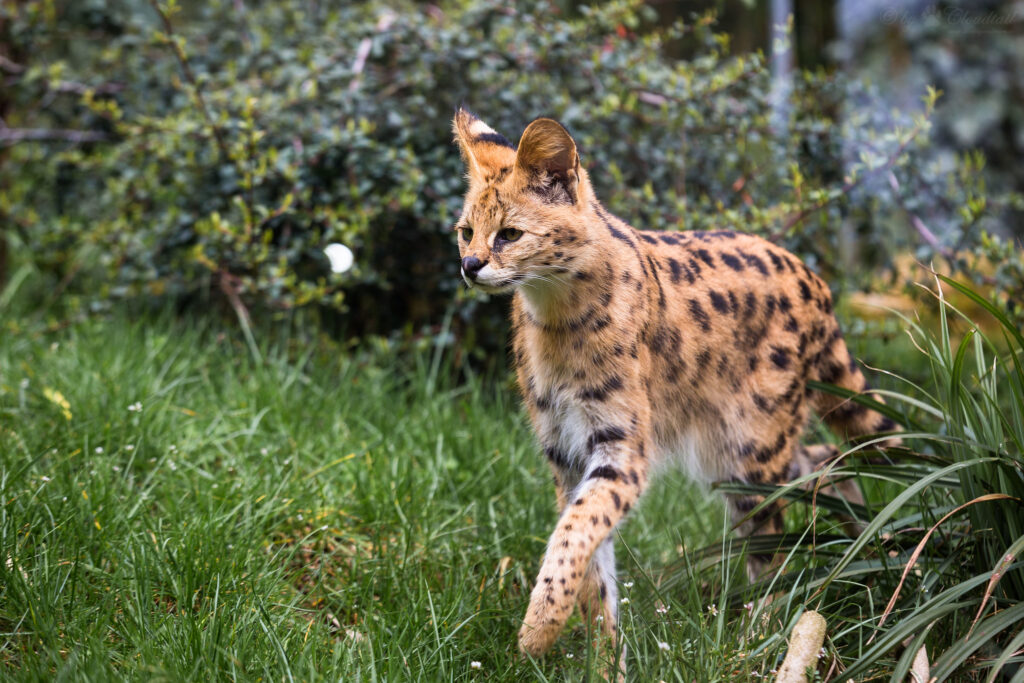
Serval cat image courtesy of Cloudtail the Snow Leopard (Flickr).
Beyond the big cats, there are also medium-sized wild cats, such as the serval. These seldom-seen predators prey on mice, rats, and other small animals, including young antelope. They use their big ears to locate prey by sound and then use their legs to run through tall grass and pounce. They are a swift and agile Botswana cat that leaps very well and hunts mostly at night.
How to recognize servals:
Servals might be common throughout Africa, but because they prefer to live and hunt in bush, tall grass, and in dry reed beds, they are hard to spot. That means it’s essential to know what they look and sound like.
- Servals are medium-sized, slender cats, weighing between 9 – 18 kg (20-40 lbs). They have small heads, large ears, and the longest legs of any cat relative to their body size.
- They are characterized by having golden coats spotted and striped in black, including a short, black-striped tail.
- Servals are solitary cats that are incredibly territorial. That’s why you’ll hear chirps, purrs, hisses, snarls, and growls.
Where can you find servals?
Servals are active in both the daytime and at night, meaning you can see them at almost anytime. On top of that, they are listed as one of the animals of “Least Concern,” according to the IUCN Red List. However, that does not mean you’ll see a serval. Because they are smaller, they are more difficult to find, especially considering they prefer wetter areas with long grass.
You’ll have your best chance of encountering a serval in northern Botswana. They can be found in Khwai and throughout the Okavango Delta as well as in the Linyanti, Kwando, and Savuti areas. Most often, good sightings occur during night drives.
Caracal
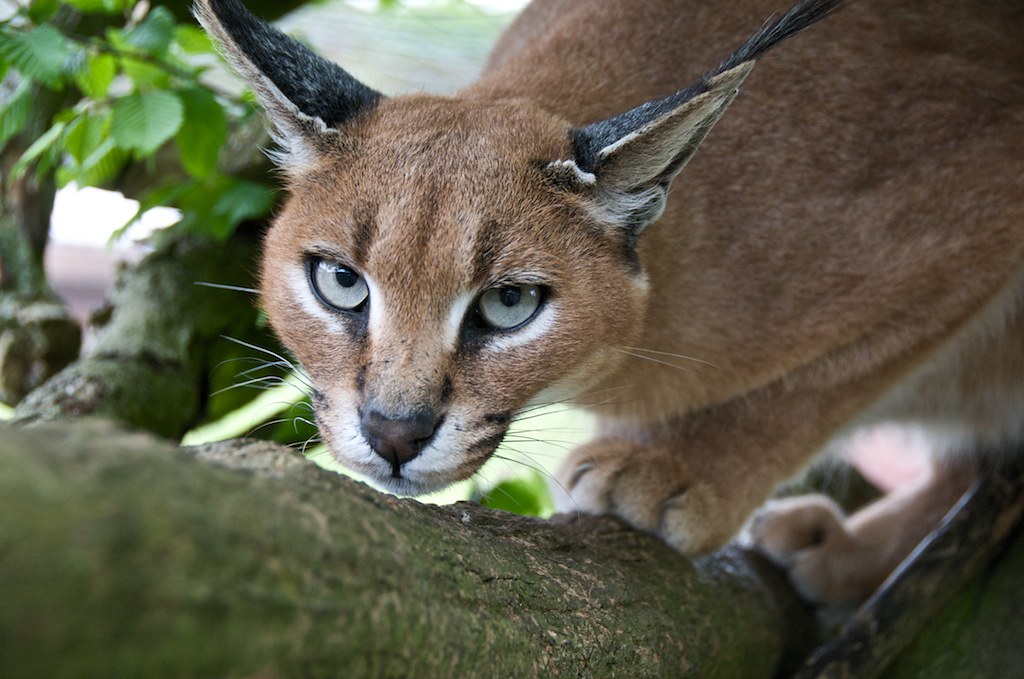
Caracal image courtesy of Andrew Halliday (Flickr).
Another rare, medium-sized cat that you might run into is the caracal. This highly secretive cat is difficult to observe, particularly since they live alone or in pairs and are active mostly at night. They are excellent leapers that can catch birds in midair, but also hunt rodents and small antelope. Remarkable hunters for their size, caracals are characterized by their ability to get within a meter of prey before pouncing.
How to recognize caracals:
Caracals are sleek cats built for sneak attacks. And they are super fast and almost silent, so seeing one in the wild is a very rare opportunity. Here’s how to recognize a caracal.
- Caracals have a robust build with long legs, short faces, and long-tufted ears. They weigh between 8 – 18 kg (18 – 40 lbs).
- Their coat is uniformly reddish tan or sandy with some lighter sections on their stomach, neck, and jaw.
- Like many smaller wild cats, they make a variety of sounds, including purrs, mews, growls, and hisses. However, these guys are mostly silent except for a “wah-wah” sound that they make when uneasy.
Where can you find caracals?
You can find caracals throughout sub-Saharan Africa. They have adapted to a wide variety of environments, which is why they are of “Least Concern” when it comes to endangered species. They mostly prefer to live in dry areas with low rainfall and lots of cover. That’s why you’re more likely to find them in savannas, marshy lowlands, semi-deserts, and scrub forests.
Your best chance of seeing a caracal—one of Botswana’s cats—is during a night drive or in the early evening. Areas such as the Kalahari and Savuti would provide the best chance of a sighting, but it is very rare.
https://www.youtube.com/watch?v=V4e6PsA6mmI
African Wildcat
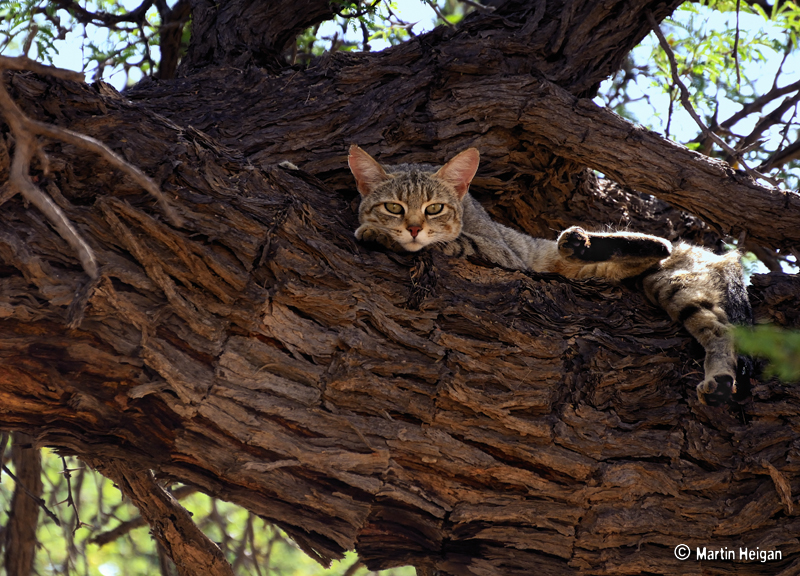
African Wildcat image courtesy of Martin Heigan (Flickr).
Found across the African continent, the African wildcat is also known as a “bush cat.” About 10,000 years ago, some African wildcats were domesticated, which is why they are considered the ancestors of the domestic cat and have many similar features. The smallest of the cats, they primarily eat mice, rats, and other small mammals, though they will also eat birds, reptiles, and insects. Most active during the night and twilight, you’ll rarely see an African wildcat on safari.
How to recognize African wildcats:
During the daytime, African wildcats tend to hide in bushes and wait until dark to hunt. And since they are also solitary, these prolific hunters are hard to spot.
- The body of an African wildcat is similar to a domesticated cat except for their long legs. Size-wise, they weigh between 2.4 – 5.5 kg (5 – 12 lbs).
- African wildcats typically have sandy brown or yellow-gray coats with black stripes on their tails. Their chins and throats are often white with rich, reddish-brown coloring on the back of their ears, belly, and on the back of their legs.
- Look for two dark rings on their forelegs and stripes on their hind legs. Their tails also tend to have two to three rings toward the end with a black tip.
Where can you find African wildcats?
The African wildcat inhabits a wide range of landscapes, but they especially enjoy hilly and mountainous regions. However, they can also be found in deserts as well as in tropical areas, grasslands, scrublands, and more. You’ll have your best chance of seeing an African wildcat on a cloudy day or after dark, during a night drive. They are well adapted to surviving in almost any region.
Black-Footed Cat
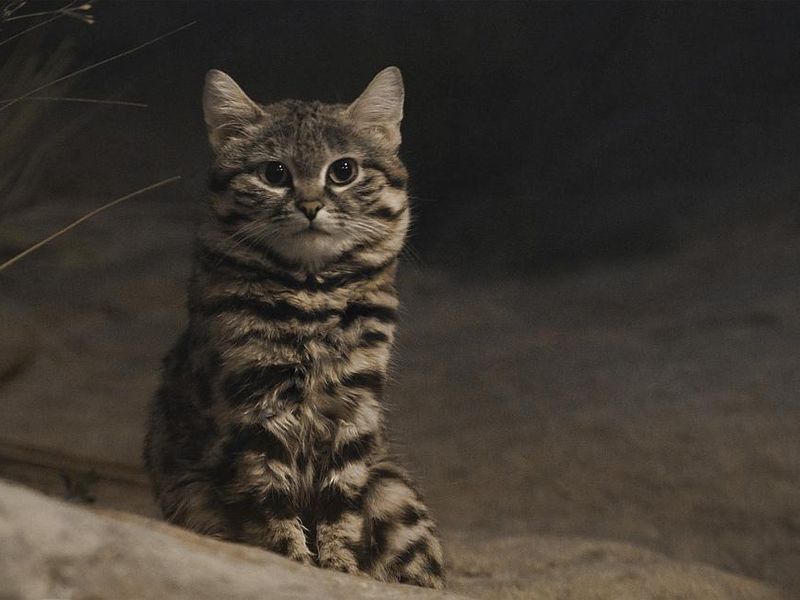
Image courtesy Smithsonian Magazine. They control all copyrights.
The smallest species of wild cats, the black-footed cat is very similar to a domestic cat. However, they are considered the deadliest cat in all of Africa. They respond to the tiniest sounds and have superb night vision, making them incredible hunters. They’ll eat almost anything that moves, including insects, birds, and other small mammals. Exceptional hunters, they stalk their prey in complete silence and then pounce when the time is right.
How to recognize black-footed cats:
Black-footed cats are adorable and look very much like a cuddly domestic cat. They are incredibly rare to see, with no recent records in Botswana.
- Black-footed cats are stocky and compact, weighing between 1.3 – 1.9 kg (2.9 – 4.2 lbs).
- They are recognizable due to their rounded ears, large eyes, and short black-tipped tails.
- Their fur is used as camouflage and is varied in color. However, it’s most often between cinnamon and tawny with patterns of black or brown spots forming rings on the legs, neck, and tail.
Where can you find black-footed cats?
Black-footed cats are found in drier areas of Southern Africa. They prefer deserts of semi-arid regions where there is hot sand and mostly tall grasses and scrubs. As one of Botswana’s cats, this means areas of the Kalahari, Nxai Pan, and Makgadikgadi are their preferred hunting grounds. However, since they are nocturnal, seeing a black-footed cat is incredibly rare, not the least of which is because they are considered “Vulnerable” according to the IUCN Red List of Threatened Animals.
So Many Amazing Botswana Cats
There are so many amazing Botswana cats to see during a safari. To see them all, you’ll have to keep your eyes peeled and have some amazing luck—especially for the smaller species. For lions, leopards, and cheetahs, Botswana is a lush hunting ground. Guests have strong possibilities of discovering a pride of lions or witnessing a lone leopard walking along the road, but with everything in the wild, nothing is guaranteed.
Check back on our blog and our social media regularly to learn more about our recent sightings. And don’t forget to check out our previous Animals of Botswana blogs, including Botswana Antelopes and Africa’s Big 5.
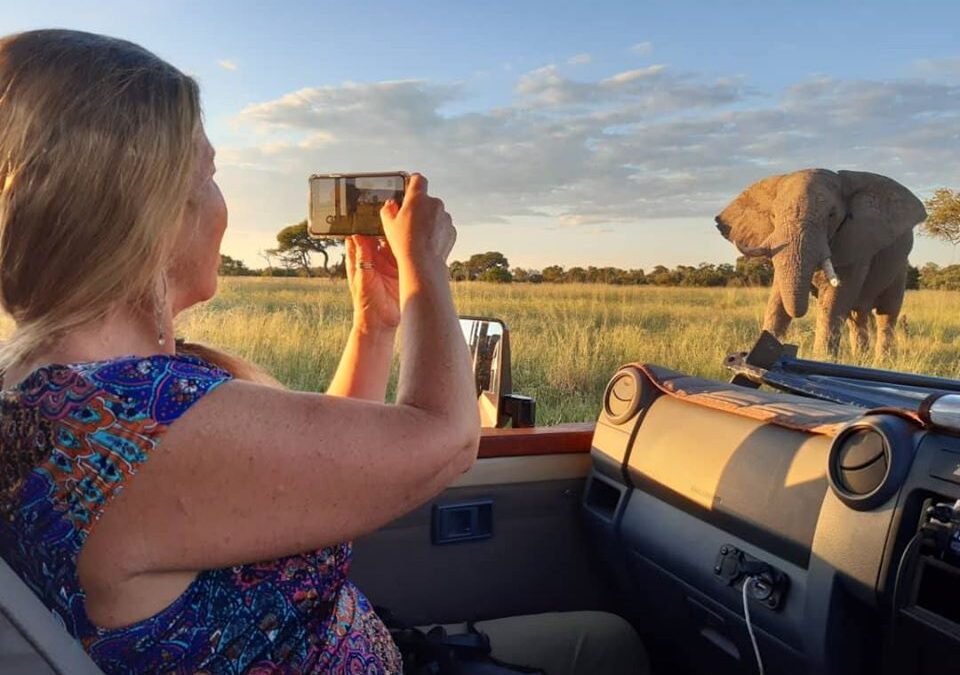
Mar 27, 2020 | Behind the Scenes, Botswana News, Brave Africa Safari, Coronavirus Content, Most Popular Blogs
There’s no beating around the bush, COVID-19 is severely impacting life as we know it around the world. Many of us are practicing social distancing, self-quarantine, and other extreme measures to end the spread. That’s why we feel that online safari content is so important right now to make up for the lack of coronavirus tourism.
Coronavirus Tourism and Small Business Impact
It is a scary time, particularly for the travel and tourism industry. Brave Africa is not immune to everything that’s going on around the world.
As a small business trying to launch our mobile lodge and safari company in 2020, the timing couldn’t be worse. Our hopes, dreams, and plans for a strong first year in business have been put on hold.
But as long as we stick together, listen to the advice of medical professionals, and do what is best for everyone, we can get through it stronger than ever.
Botswana Coronavirus Update – March 27, 2020
While Botswana (as of Friday, March 27, 2020) still has no confirmed cases of the virus, tourism has effectively shut down in the country.
According to the Government of Botswana in line with the Public Health Act 2013, all individuals from the following high-risk countries will not be allowed entry: China, Japan, South Korea, Iran, USA, UK, Austria, Belgium, Denmark, France, Germany, Italy, Netherlands, Norway, Spain, Sweden, Switzerland and India. There’s also warning of an “imminent countrywide lock-down” to stem the spread of the coronavirus pandemic with soldiers watching all borders.
Already, almost all international travel has shut down, but there is good news. We will still be here when the coronavirus is defeated and life returns to normal (or the new normal), whether that’s in a few weeks or a few months.
Brave Africa’s Coronavirus Response: GREAT Online Safari Content
The Brave Africa team is in constant communication about how to handle the coronavirus crisis and what we can do to keep moving forward. As we wrote in our previous blog, we are allowing all current clients to postpone their booking up to 12 months with no penalties. And we’re honoring the same rate whether you rebook this year or wait until 2021.
But what about for everyone stuck at home, dreaming of being anywhere else?
We are going to be providing great content across our social media platforms and blog. If you can’t come to us for a safari, we’ll come to you on Facebook, Instagram, Twitter, and YouTube.
Here’s a little about the type of online safari content you can expect to keep you entertained as you are quarantined
#VirtualSafari Mondays
On Mondays, we’re going to start taking you on virtual safaris (#virtualsafari)! From the comfort of your home, you can journey with us into the Okavango Delta in Botswana to see the animals, hear the sounds of the bush, and experience the majesty of being on safari.
The goal is to let you get out of the house even just for a little while through your phone or computer screen. We want you to have something to look forward to every Monday for the coming weeks and months as we protect ourselves and each other. It’s the easiest way to enjoy some coronavirus tourism.
So, be sure to tune into our social media pages every Monday to check out the latest #virtualsafari video!
Watch the first video here!
Puzzle Wednesdays
To help keep you entertained while you’re at home in self-quarantine, we’ve started sharing a fun puzzle every Wednesday on our Facebook and Twitter pages. This online puzzle takes one of our favorite pictures from safari and breaks it down into 48 puzzle pieces (or more) that you can then put together online.
It’s a great diversion for ten or so minutes in the middle of the week when we know you can really use it. If you really like these puzzles, we’ll keep them up and make them harder as we go! You can find our first African sunset puzzle here.
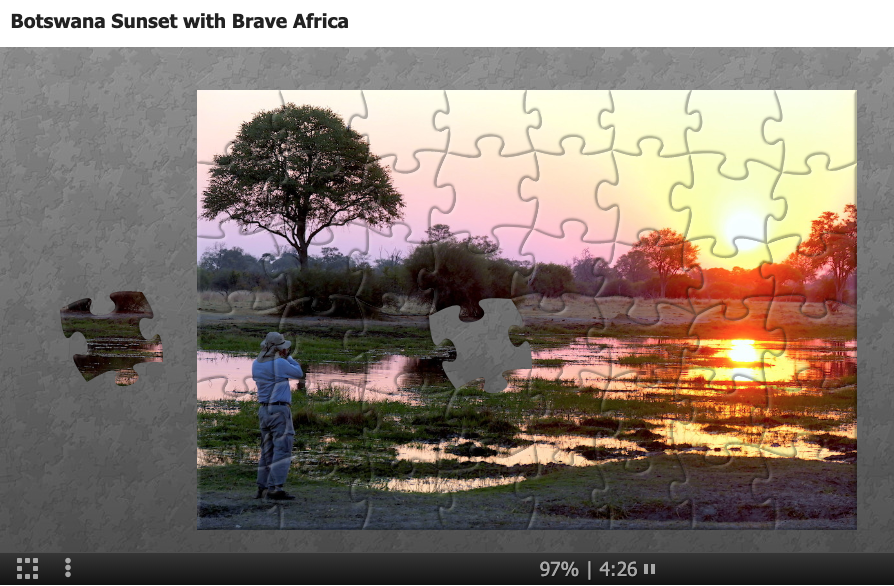
We’d like to thank Hills of Africa for this great idea, which they first shared on their Facebook page.
Coloring Book Fridays
Then, on Fridays, we’re sharing pictures from our Brave Africa coloring book! We’re taking some of our favorite safari images and transforming them into black and white coloring pages that you can print out at home and transform into your own artwork.
So far, we’ve shared a gorgeous image of a Lilac Breasted Roller as well as a picture of a leopard on the prowl.
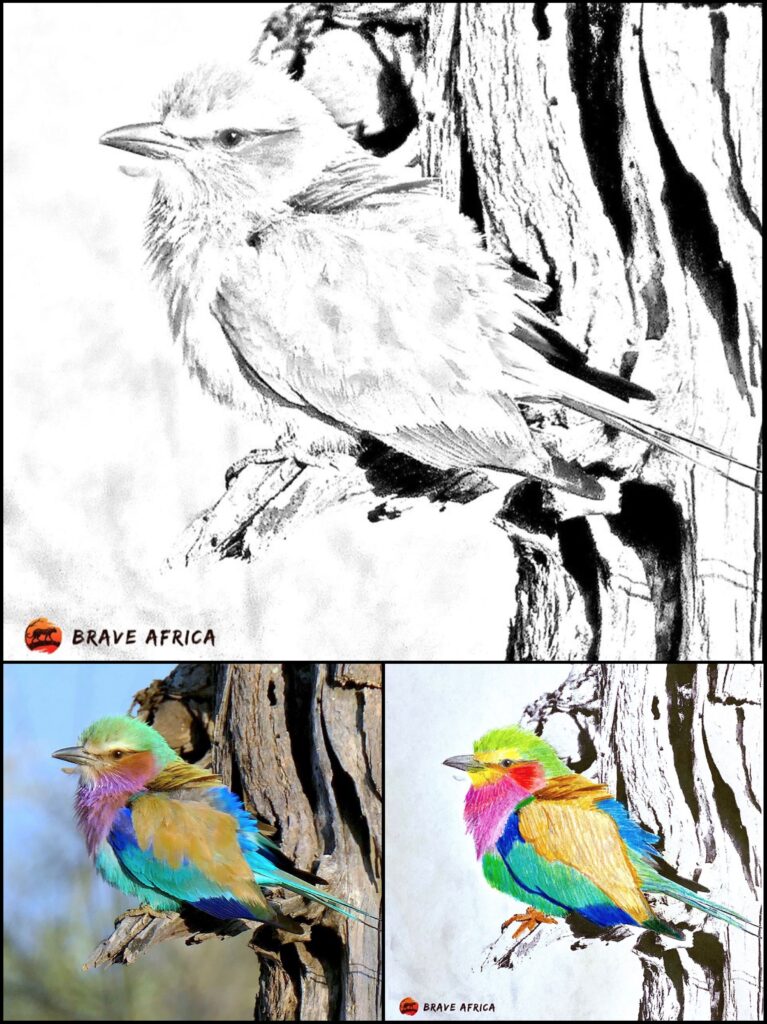
We encourage you to go as crazy or as accurate as you want on the drawings. That’s why we’ll always upload the original photo along with the coloring book download, so you can decide what type of art you want to create. Is this fun online safari content, or what!?
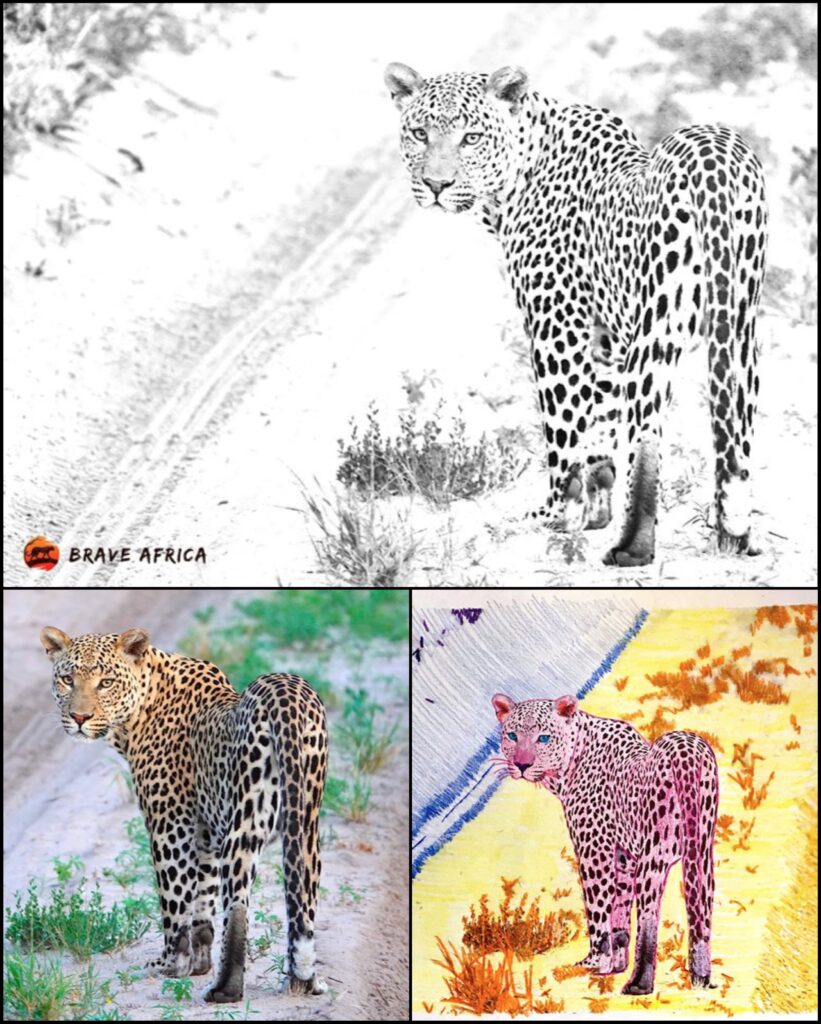
Photos from the Bush
We know there’s a lot of doom and gloom in the world right now, so we promise to continue sharing beautiful, inspiring, and fun photos from the bush. Because we all need something to smile about during this time.
You might not be able to go on safari right now, or even in the next few weeks, (since COVID-19 tourism is not allowed) but the bush is always there, waiting for us to explore. Join us throughout the week as we share candid animal pictures taken by our guests and employees.
It is just one small way we hope our online safari content brightens up each of your days.
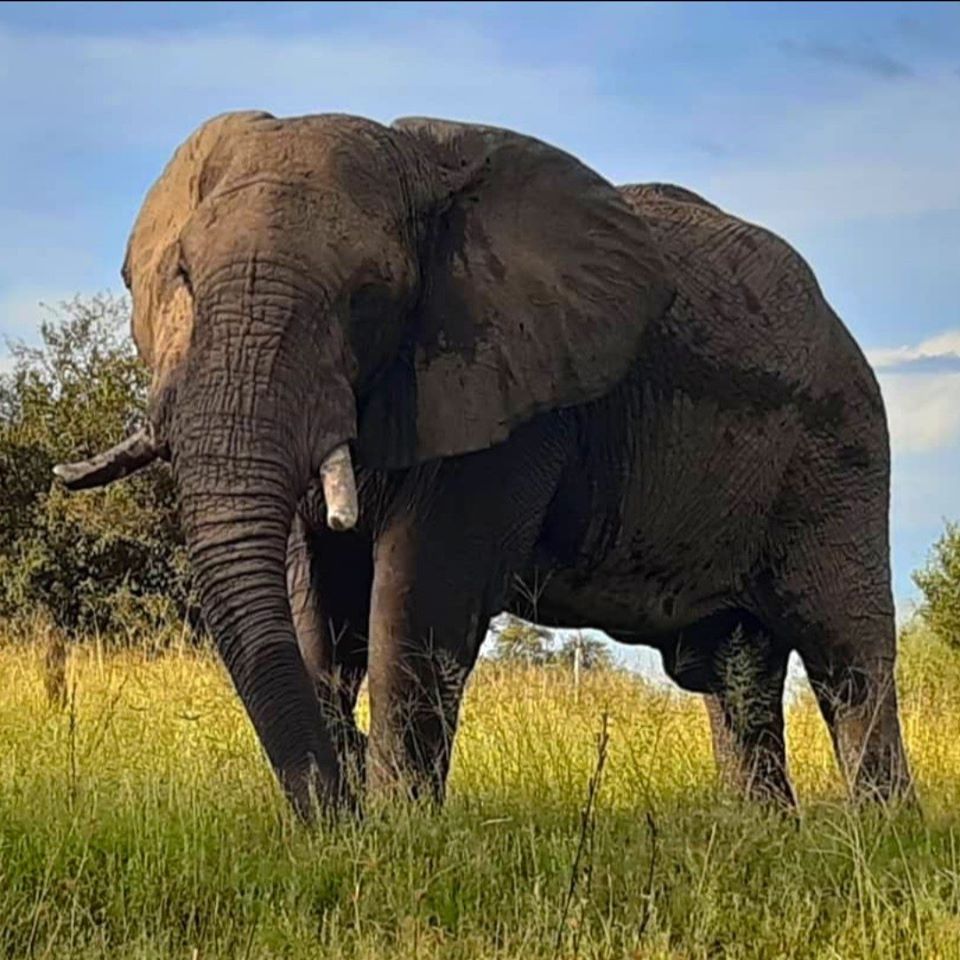
Vacation Planning
Sometimes the best way to get through an unpleasant time is to think about the future. Truthfully, we do not know when the coronavirus pandemic will end, and travel will return to normal. We hope it is only a few weeks or months from now, but it could be much longer than that.
No matter how long it takes, we do know that there will be light at the end of the tunnel. Whether it is this summer, fall, winter, or 2021, we will be able to travel and explore the world again. And we do not know about you, but we are definitely going to have cabin fever!
What better way to pass the days than to plan your future vacation? You do not have to make any commitments right now, we know things are too uncertain, but you can dream.
This is a great time to collect airline miles and credit card points so you can get a free flight to Africa later this year or next. It is also an excellent opportunity to begin budgeting and planning your dream vacation.
During these next few weeks, we will try to help you out with blogs and other content offering tips and advice on planning your dream safari vacation. It is never too early to get started. There is a lot you need to know and do to have the best trip possible, so we will be here to help.
Online Safari Content You Want
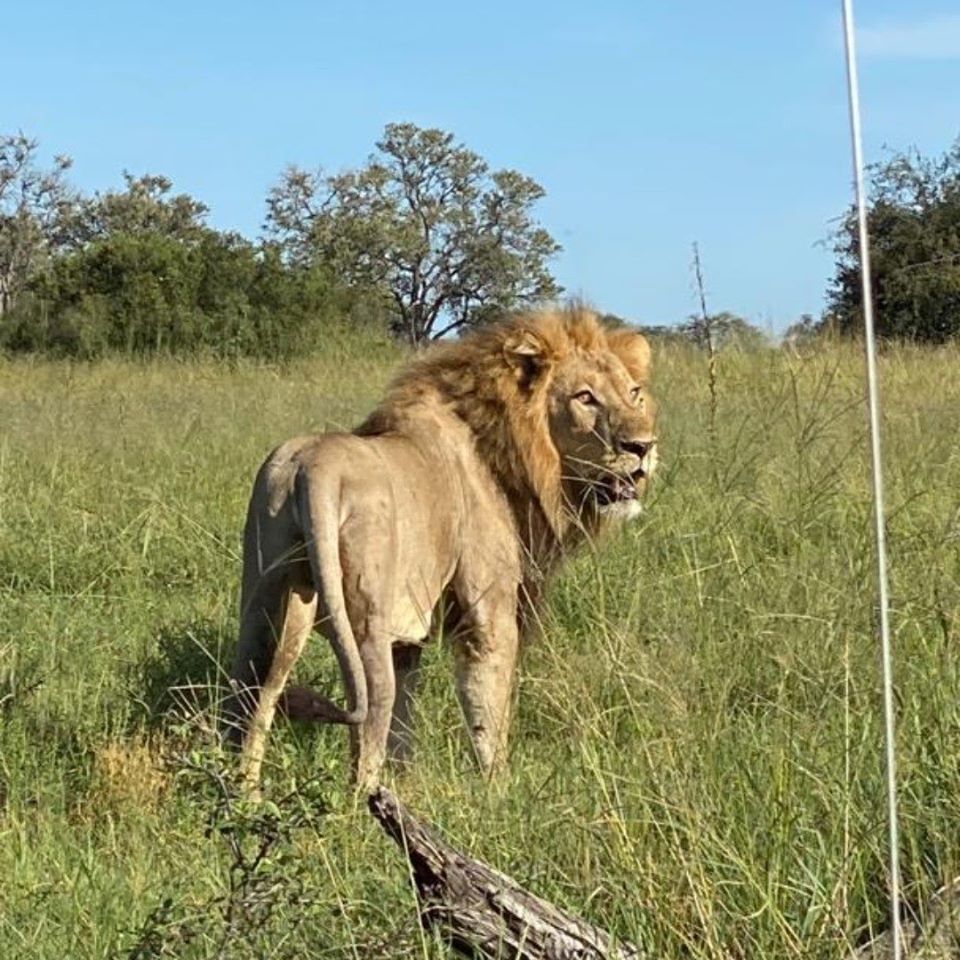
Last, but certainly not least, we would love feedback about what type of content you would like to see.
We know how negatively COVID-19 is affecting everything and its particularly strong impact on the travel industry is unlike anything we have ever seen before. So, we would like to know what online safari content you want to see.
Do you want:
- More videos and images from the bush because they are a great distraction from the constant stream of bad news?
- More information about what is going on in Botswana and how the coronavirus is impacting everything there?
- Behind the scenes looks at what Brave Africa is doing to weather the coronavirus crisis?
Let us know!
Final Thoughts
We know this is a challenging time for everyone. The good news is that it also presents an incredible opportunity for all of us to put aside our differences and come together as a global community. We are all in this together, and the more we can do to support each other, the better.
Our thoughts are with those who are sick, have lost their jobs, or are otherwise struggling in the world as it is now.
At Brave Africa, we are doing our best to hang in there during the storm and make it out to the other side. Stay tuned as we update our website, keep sharing great content, and do what we can to keep you informed.
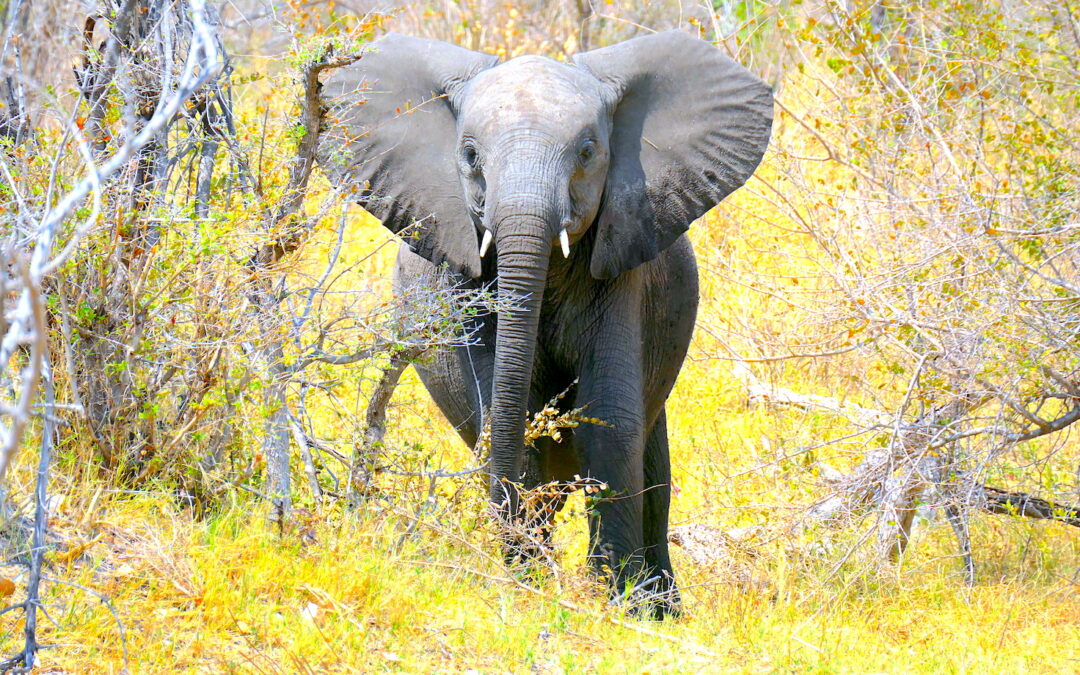
Mar 23, 2020 | Behind the Scenes, Brave Africa Safari, Coronavirus Content
The coronavirus is causing a ton of uncertainty right now. Reading just a few news stories is enough to make you think that the world will never be the same and that once-in-a-lifetime safaris in 2021 will only ever be a dream. And it’s true that the travel and tourism industries have been severely and negatively impacted by COVID-19, but don’t count us out. In 2021, Brave Africa will still be around.
We know a lot of people are hesitating to plan or even think about their vacation in 2021. Which airlines, hotels, and tour operators will still be around next year? Already, 50 million jobs in the global travel sector are at risk, some airlines could go bankrupt, and hotels are asking for bailouts.
But Brave Africa still be around to take you on an African safari in the future. We won’t be another casualty of the coronavirus pandemic.
Brave Africa Will Outlast This Pandemic!
Obviously, we cannot predict the future with certainty or guarantee anything, but being debt-free and having adequate cash reserves puts Brave Africa in the best position possible to survive this unprecedented impact to travel and tourism. We are at low risk of going bankrupt even if there are no more safari-goers for the remaining nine months of 2020, and we are confident that Brave Africa will still be here to host once-in-a-lifetime safaris in 2021 and beyond.
Although we are a brand-new operator, Brave Africa is in solid financial health and we have the knowledge, experience, and foundation to outlast the pandemic. Out of all of the scenarios tour operators and lodges can find themselves in during these unpredictable times, Brave Africa is as set for success as we can be.
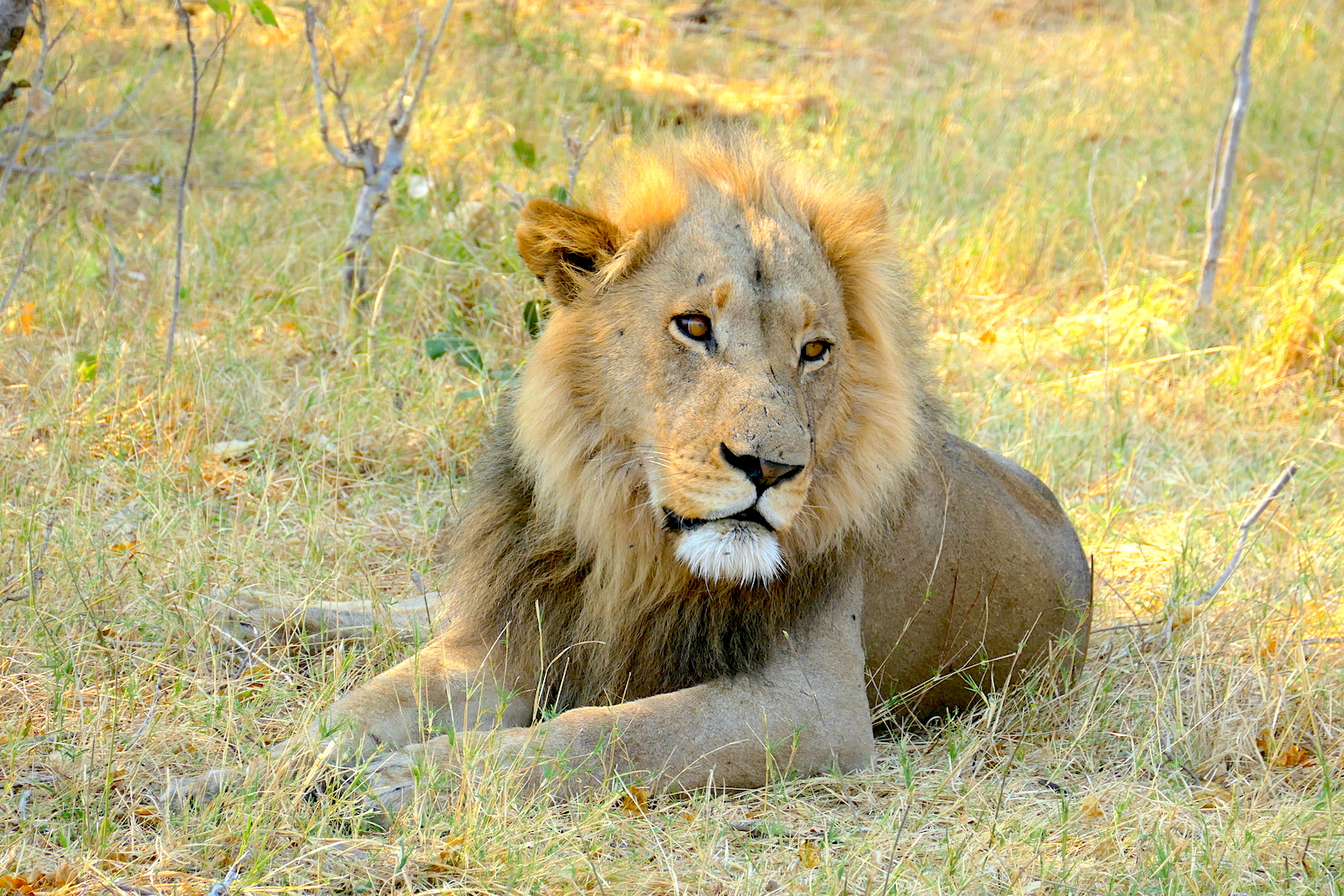
We’re looking ahead to 2021, and the future looks bright. We will get through this together.
Brave Africa is Debt-Free
First and foremost, Brave Africa has no debt. Unlike many other hospitality operators, we have no expensive construction loans, commercial mortgages, private land leases, automobile loans, or other major liabilities that we would be obligated to pay in spite of reduced revenues.
We own all of our assets outright, including our vehicles, tents, and other camp equipment.
Low Operating Expenses
In addition, most of our operating expenses are only incurred if we have paying customers. For example, as a mobile lodge, we benefit from the fact that we only pay for campsites when they are in use. We also only purchase food and other safari supplies shortly before each scheduled adventure, so there is no product waste or inventory spoilage that we have to worry about.
When we are not running safaris, are only expenses are staff payroll, business insurance, and a small office rent. This means that we have enough cash reserves to remain in business for the next 12 months even without any incoming revenue.
Experienced Executives/Investors
The Brave Africa team is also composed of experienced executives and investors who have knowledge weathering tough financial storms.
One of our owners has a background in accounting as well as running a successful software company in the United States. He has been able to guide our team down the right path to ensure that Brave Africa remains financially solvent in spite of any turbulence in the safari industry.
As for our financial backers, they are highly invested in Brave Africa’s success. They believe in our vision and business. If required, they are willing to put additional investment into the company to continue operations for the foreseeable future.
Plan with Confidence
We ask that everyone stay safe, and when we get to the other side, know that in 2021, Brave Africa will be here and ready to take you on an unforgettable trip!
For now, for as long as physical distancing, self-quarantining, and travel restrictions last, we will continue to bring the African bush to you! Check out our Facebook, Instagram, Twitter, and YouTube accounts to escape for a moment (our next blog will explain exactly what we’re doing).
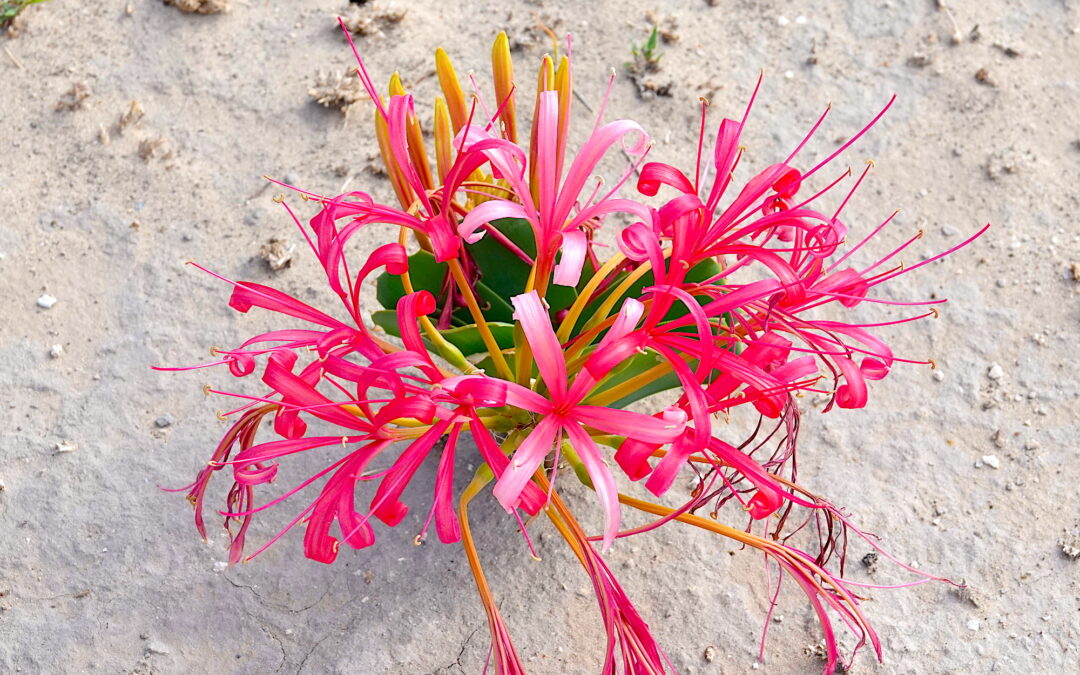
Mar 10, 2020 | Botswana News, Brave Africa Safari, Coronavirus Content
We know that travel right now is frightening. With the coronavirus (Covid-19) spreading more and more quickly, we know that many people are canceling or placing their travel plans on hold for now. And we completely understand. However, if you do decide to still travel, we want you to know that we are doing everything within our power to ensure you have a great time with Brave Africa. Read our new Brave Africa coronavirus policy below.
Coronavirus Update in Botswana and Southern Africa
Currently, coronavirus infections have been few and far between on the African continent. Egypt is home to more than half of all confirmed cases on the content with 59 confirmed. The good news is that Egypt is nowhere close to Botswana, which still has ZERO confirmed cases.
South Africa recently announced seven confirmed cases, all from the same group of ten people who returned from a vacation in northern Italy. The infected individuals have all self-quarantined, and so far no cases have been discovered outside of the group—all of whom are young and in generally good health.
All of this is to say that Africa may be one of the safest places to visit when it comes to the coronavirus. There are very few if any cases across the continent, and when you go on safari, you are generally around a very small, select group of people. So, there is very little chance to catch the virus from other travelers.
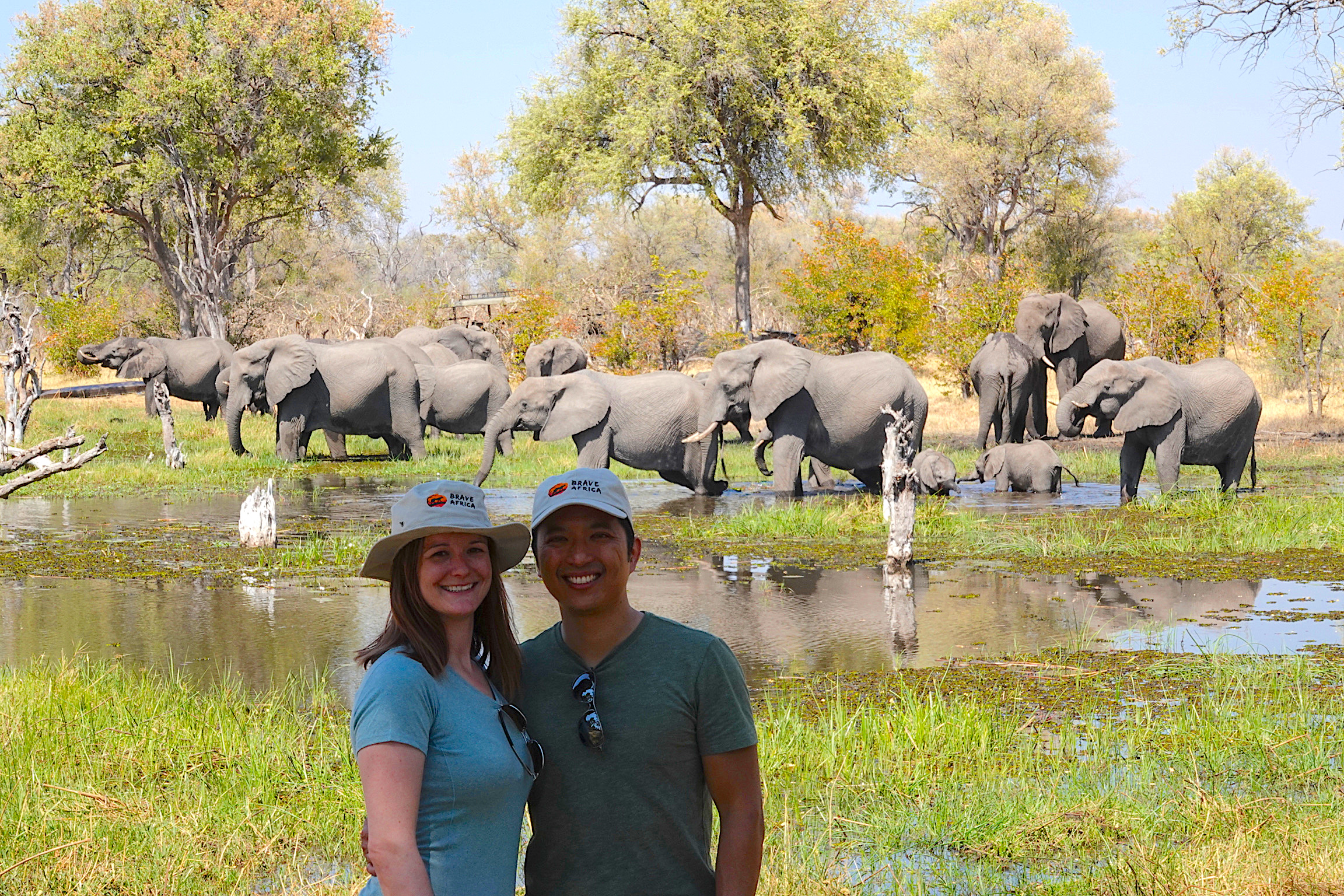
Our Brave Africa Coronavirus Policy
However, if you are still concerned about traveling to go on safari with Brave Africa during this time, we have put in place a few coronavirus policies to ease your mind.
Postpone Bookings Up to 12 Months Out
If you have booked a safari with Brave Africa or are planning to book a safari with Brave Africa through June 30, 2020, but you are concerned that the coronavirus could affect your travel, we are offering the ability to postpone your booking for up to 12 months. There will be NO penalty to postpone for a later travel date. In this way, you can still plan your safari with us but have the comfort of knowing that you can change your plans as required by the virus.
To postpone your booking:
- 15 Days Warning: You will need to contact us at least 15 days prior to your arrival in order to postpone without any monetary penalties. We begin purchasing food and other products for your trip at least 15 days out, and so need this time to plan as needed.
- Rate Changes Apply: You can postpone your booking and re-plan your trip for any time in the next 12 months. However, if you plan your trip for 2021 or change your trip dates to a different season (you originally booked your trip in low season and now plan to visit us in high season), you will need to pay for the rate change between your original booking date and the new date. This is not a penalty, but simply to cover the cost of your new rates.
If you would like to cancel your booking with Brave Africa completely instead of postponing your trip, our standard cancelation policy applies.
For any questions or concerns about going on safari with Brave Africa during the coronavirus situation, please feel free to contact us at info@braveafrica.com.

Mar 2, 2020 | Botswana News, Coronavirus Content
April 1, 2020: Updated information on coronavirus infections and your safari vacation in Botswana.
Disclaimer: We are not doctors, nor are we medical professionals. We are not offering advice or telling you what you should or should not do. If you are at all concerned about your health and safety, you need to do what is best for you and your family. And you should always consult a medical professional with any questions or concerns before planning your safari vacation in Botswana.
That being said, we do want to address traveling with the coronavirus outbreak, including what you need to know about Africa—particularly Botswana. Information is continuing to change at a rapid pace. Every day or two, we are gaining more insight into the COVID-19 pandemic and how it’s affecting Botswana. We will try to keep this post updated weekly, so you have the latest information.
(more…)




















